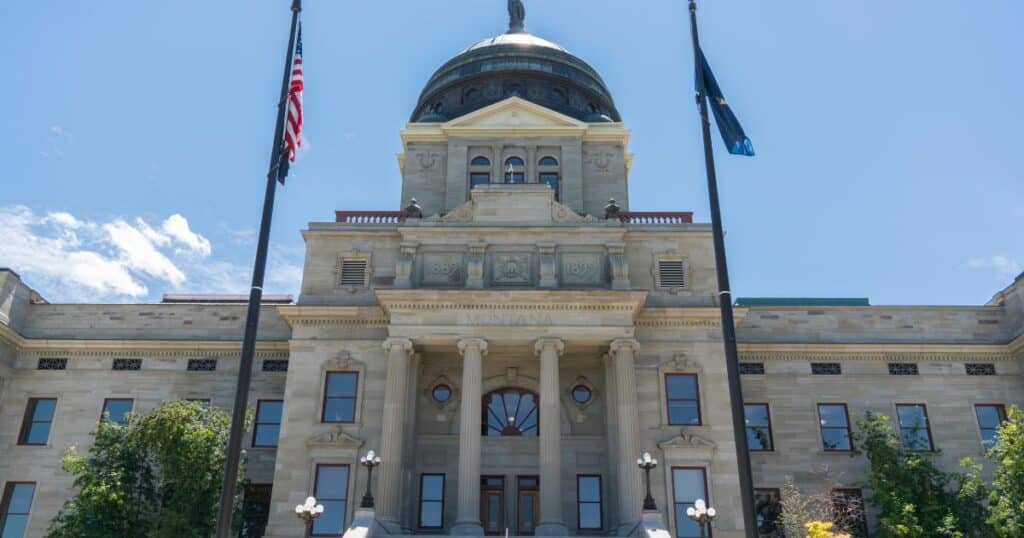Montana Gov. Greg Gianforte vetoed Senate Bill 442 in the final hours of the 2023 legislative session, even though it was a heavily favored bipartisan bill. SB 442 proposed to divide tax revenues levied on recreational marijuana sales between the General Fund, county road construction and maintenance, conservation and recreation programs, addiction treatment, and veterans services.
The sponsor of this popular initiative is now asking for lawmakers to be given another chance to override the veto. This comes after months of efforts from both sides of the aisle to pass this bill with little success. The outcome of Gianforte’s veto has many people questioning whether their voices are being heard regarding legislation concerning cannabis policy in Montana.
This override would be a significant milestone if allowed and could set the tone for a new era of cannabis legislation in Montana. With over $50 million of cannabis tax revenue at stake, it’s easy to see why everyone is so invested in this issue.
It remains to be seen if lawmakers will get their chance to weigh in on this bill or if the veto must ultimately stand. Either way, it looks like cannabis policy in Montana will remain at the center of debate for some time.
Reaction to Gianforte’s Veto
The reaction to Gov. Greg Gianforte’s veto of Senate Bill 442 has been largely critical from both sides of the aisle. Montana Association of Counties and Wild Montana have both expressed frustration with the logic and process surrounding the veto, noting that it was issued in the final hours of the 2023 legislative session when lawmakers had already voted on the bill.
Noah Marion from Wild Montana released a statement calling for lawmakers to be given another chance to weigh in on this bill, saying, “It is essential that our elected representatives have an opportunity to override this veto if they choose. This would serve as a powerful signal that Montanans will not stand for executive overreach when it comes to cannabis policy.”

The initiative’s sponsor has also requested that Secretary of State Christi Jacobsen take measures to protect Legislature’s constitutional check on the executive branch by allowing lawmakers to override this veto.
This is an essential step towards ensuring that the voices of all Montanans are heard and respected when it comes to cannabis legislation in Montana. It remains unclear at this time whether or not Gov. Gianforte will honor these requests, but the outcome could significantly impact the future of cannabis policy in Montana for years to come.
Tax Revenue Allocation Dispute
The issue of how to allocate more than $50 million in marijuana tax revenue has been a source of heated debate since Senate Bill 442 was introduced.
The proposed bill would divide the tax revenues levied on recreational marijuana sales between the General Fund, county road construction and maintenance, conservation and recreation programs, addiction treatment, and veterans services. However, several other proposals have been put forth that offer different approaches for divvying up this funding.
Gov. Gianforte expressed concerns that funds allocated from recreational marijuana sales through SB 442 could be used for purposes other than those outlined in the bill. He instead backed HB 462, which calls for allocating more money toward law enforcement rather than conservation and recreation programs.
Another competing proposal is HB 669, which calls for more money toward education rather than addiction treatment or veterans services. Proponents of this plan argue that increased funding for public schools would benefit children’s education and help Montana’s economy in the long run. Opponents of this plan say that it neglects necessary services like addiction treatment, which could benefit many Montanans.

However, supporters of SB 442 argue that this bill is evident in its intention to divvy up tax revenues levied on recreational marijuana sales between the General Fund, county road construction and maintenance, conservation and recreation programs, addiction treatment, and veterans services. They are disappointed that Gov. Gianforte overrides their efforts with a veto without considering their proposal.
It is important to note that vetoing SB 442 does not necessarily mean the proposed tax revenue allocations will not be realized. Lawmakers are now given a chance to override Gov. Gianforte’s veto and ensure that marijuana tax revenues are fairly distributed according to the state’s needs. This could provide much-needed funding for addiction treatment, veterans services, and other programs outlined in SB 442.
It remains unclear what the outcome of this debate will be or which approach will ultimately prevail when divvying up marijuana tax revenue.
However, the future of cannabis policy in Montana certainly hangs on this decision, and all Montanans should have an opportunity to make their voices heard. Ultimately, lawmakers must be given a chance to override Gov. Gianforte’s veto to ensure that all interests are considered when crafting cannabis legislation in Montana.
Enjoyed that first hit? Come chill with us every week at the Friday Sesh for a freshly packed bowl of the week’s best cannabis news!


















